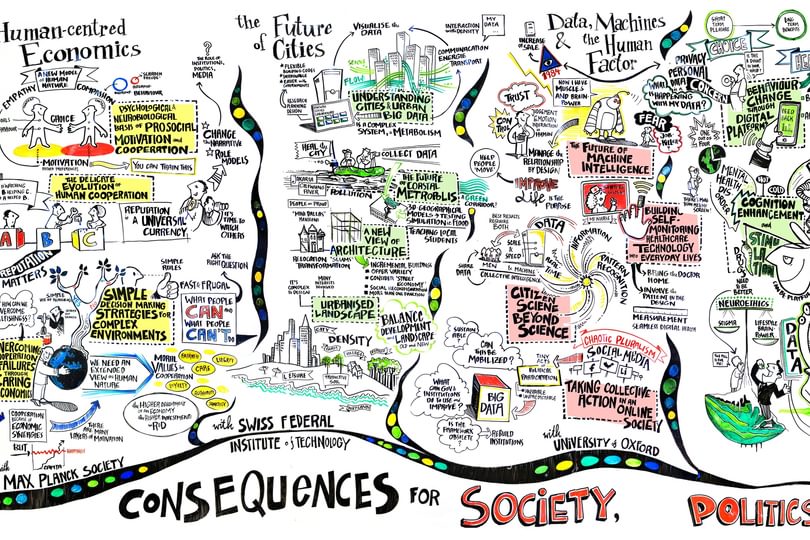
Fast-paced presentations from Oxford academics sparked lively debate at the World Economic Forum’s annual meeting in Davos last week.
In a packed session at the event’s IdeasLab, a team led by the Oxford Martin School’s Director Ian Goldin tackled the subject of ‘Data, Machines and the Human Factor’. The quick-fire, pecha kucha-style presentations looked at how to harness the potential of our hyper-connected world and mitigate the cascading risks which may result.
Professor Goldin discussed the future of machine intelligence and was followed by Dr Chris Lintott, Co-Director of the Oxford Martin School’s Programme on Computational Cosmology, who looked at citizen science and its application in real-life situations. Professor Lionel Tarassenko, Professor in Electrical and Electronic Engineering, then spoke on advances in building self-monitoring healthcare technology into everyday lives, and Professor Helen Margetts, Director of the Oxford Internet Institute, explored the topic of taking collective action in an online society. The session was introduced by the University of Oxford’s Vice-Chancellor, Professor Andrew Hamilton, and was facilitated by Dr Richard Pascale, Associate Fellow, Saïd Business School.
Attendees at the University of Oxford IdeasLab included musician and humanitarian activist Peter Gabriel, and the presentations were followed by workshops where discussion on individual themes continued.
Professor Goldin led a number of other sessions at Davos, including a dinner session entitled ‘Re-thinking the Future’. He also spoke on the need to manage global risks in areas such as the economy, climate and cyber security, key themes of his forthcoming book, ‘The Butterfly Defect: How Globalization Creates Systemic Risks, And What To Do About It’.
A number of members of the Oxford Martin Commission for Future Generations also attended Davos, including its Chair, Pascal Lamy, Lord Rees, Lord Stern, Julia Marton-Lefevre, Kishore Mahbubani and Arianna Huffington. In October the Oxford Martin School published the report of the Commission, Now for the Long Term, which focused on tackling the increasing short-termism of modern politics and our collective inability to break gridlock on the biggest challenges shaping our future.
As well as meeting Commissioners to discuss work to follow up Now for the Long Term, Professor Goldin also met with other key figures to talk about moving forward the report’s recommendations, particularly around climate change, and about the School’s research themes.
“Davos was very productive for the school and we made progress on driving forward a number of the Commission’s recommendations,” said Professor Goldin. “It is a great place to link very efficiently with government ministers, private sector leaders and heads of international agencies.”
While in Davos, Professor Goldin was interviewed by HuffPost Live on the urgent need for action on climate change, as part of the launch of WorldPost.
Reflecting on the event, Dr Lintott said: "Davos is fascinating for the sheer diversity of conversations; in my case, as well as talking about cutting edge astrophysics (and discussing a trillion dollar plan to hollow out an asteroid and sail to the nearest star), it was a chance to take seriously the idea that we could apply the techniques of citizen science to other fields.
"In particular, it was good to draw on ideas from all sorts of people as to how we might rapidly process images in the service of disaster relief, and we hope to be trying this out sometime soon."